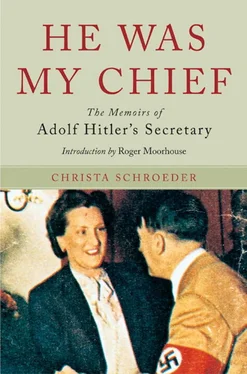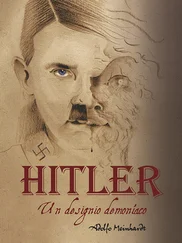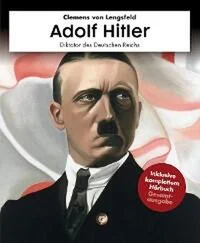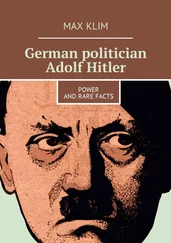Christa Schroeder - He Was My Chief - The Memoirs of Adolf Hitler's Secretary
Здесь есть возможность читать онлайн «Christa Schroeder - He Was My Chief - The Memoirs of Adolf Hitler's Secretary» весь текст электронной книги совершенно бесплатно (целиком полную версию без сокращений). В некоторых случаях можно слушать аудио, скачать через торрент в формате fb2 и присутствует краткое содержание. Город: Barnsley, Год выпуска: 2012, ISBN: 2012, Издательство: Frontline Books, Жанр: История, Биографии и Мемуары, на английском языке. Описание произведения, (предисловие) а так же отзывы посетителей доступны на портале библиотеки ЛибКат.
- Название:He Was My Chief: The Memoirs of Adolf Hitler's Secretary
- Автор:
- Издательство:Frontline Books
- Жанр:
- Год:2012
- Город:Barnsley
- ISBN:978-1-7830-3064-4
- Рейтинг книги:4 / 5. Голосов: 1
-
Избранное:Добавить в избранное
- Отзывы:
-
Ваша оценка:
- 80
- 1
- 2
- 3
- 4
- 5
He Was My Chief: The Memoirs of Adolf Hitler's Secretary: краткое содержание, описание и аннотация
Предлагаем к чтению аннотацию, описание, краткое содержание или предисловие (зависит от того, что написал сам автор книги «He Was My Chief: The Memoirs of Adolf Hitler's Secretary»). Если вы не нашли необходимую информацию о книге — напишите в комментариях, мы постараемся отыскать её.
He Was My Chief: The Memoirs of Adolf Hitler's Secretary — читать онлайн бесплатно полную книгу (весь текст) целиком
Ниже представлен текст книги, разбитый по страницам. Система сохранения места последней прочитанной страницы, позволяет с удобством читать онлайн бесплатно книгу «He Was My Chief: The Memoirs of Adolf Hitler's Secretary», без необходимости каждый раз заново искать на чём Вы остановились. Поставьте закладку, и сможете в любой момент перейти на страницу, на которой закончили чтение.
Интервал:
Закладка:
Schroeder:Early on Hitler used to dictate his big speeches for me to type directly into the machine.
Mr Albrecht:Did he edit them afterwards?
Schroeder:He used to correct them himself a lot.
Mr Albrecht:Did anyone else go over them?
Schroeder:No.
Mr Albrecht:Even Goebbels had no influence on the contents?
Schroeder:No, he just provided statistics if they were called for. Hitler composed all his own speeches. He had a very good style and would keep putting finishing touches to them to the last moment.
Mr Albrecht:Did Hitler dictate orders personally to the front troops?
Schroeder:No, that was mostly done by the Wehrmacht.
Mr Albrecht:Apart from letters of thanks and so on did Hitler have personal correspondence with friends?
Schroeder:No, he always emphasised that that was his great strength, even in the early days, to have written no letters: if they had fallen into the wrong hands they could have been exploited.
Mr Albrecht:You were present at mealtimes?
Schroeder:Towards the end only at lunch and the teas at night.
Mr Albrecht:What things were discussed at lunch?
Schroeder:They were not of a political nature. People talked about architecture, theatre, music, the German language, about things to be done in the future, about his plans.
Mr Albrecht:Was rebuilding the cities discussed?
Schroeder:Yes.
Mr Albrecht:Whose job would that have been?
Schroeder:Professor Frick had already started on it. Professor Giesler was to complete it. In the end Speer would have taken it over because it was his province.
Mr Albrecht:There was no general rebuilding plan?
Schroeder:No. Medical matters were also talked about at lunch. Professor Morell was very interested in hormone research. This subject also interested Hitler. He thought there was still a lot to be done in this field. Hitler was also interested in nutrition.
Mr Albrecht:Racial questions belonged in the political arena?
Schroeder:Occasionally the subject was touched upon. I never gave it much thought because the theory has a lot of holes in it. Many women have deceived their husbands. I often told Hitler that.
Mr Albrecht:Could one debate freely with Hitler?
Schroeder:Yes, up to a point. I knew where my limits lay.
Mr Albrecht:Was Fräulein (Eva) Braun present at these mealtimes?
Schroeder:Fräulein Braun was only in Berlin towards the end. She attended occasionally.
Mr Albrecht:Did Hitler look on her as his wife?
Schroeder:He treated her that way.
Mr Albrecht:He looked on her as such?
Schroeder:Yes, I said so.
Mr Albrecht:There were no children?
Schroeder:No. Some years ago I read something about that in an American paper. A lot of what was said is untrue. Leni Riefenstahl was mentioned once. There is a kind of woman who does not refute rumours like that. Leni Riefenstahl was that kind of woman, she used it for her own purposes.
Mr Albrecht:What type of relationship was there between Hitler and Renate Müller?
Schroeder:There was none. Hitler thought she was a good actress because she looked the part of the perfect German maiden. But he had no personal relationship with Renate Müller. Towards the end Hitler would not spend even half an hour at the meal table. Usually Reichsleiter Bormann would report after the meal. Lunch was often taken around four or five in the afternoon.
Mr Albrecht:Did Hitler have no personal correspondence?
Schroeder:No, on principle. He wrote a short letter to his sister when he sent her some bacon he had received as a gift from Spain. He had no sense of family. He admitted it himself. Hitler had two sisters. His full sister was Paula Hitler who lived in Vienna. His half-sister Angela Hitler, widow of Raubal, married Professor Hammitzsch in Dresden.
Mr Albrecht:What was the reason for his having such a poor family relationship?
Schroeder:Well, first of all he didn’t have any real siblings. His father married three times. The father grew up an orphan. He worked his own way up. He learned the craft of shoemaker in Austria then went to school in the city. In the end he ran a Customs office and got himself a property.
Mr Albrecht:Did Hitler talk about his childhood?
Schroeder:I made lots of notes about that. I left them in my luggage at the Reich Chancellery in Berlin. I took more interest in his life than his family. Supper was around nine or ten. When we were at FHQ, the secretaries attended, in Berlin only Fräulein Braun did. Fräulein Braun is not very healthy, she is very delicate.
Mr Albrecht:Was she ill?
Schroeder:Not actually ill, but very delicate and tired. The Berlin climate did not suit her.
Mr Albrecht:At the nightly tea was Hitler a lively talker?
Schroeder:Yes.
Mr Albrecht:When was the last tea?
Schroeder:On the night of 19 April 1945.
Mr Albrecht:Was Hitler very depressed in the final days?
Schroeder:The final days were from the beginning of April, I would say.
Mr Albrecht:In September 1944 he was laid up a long while in bed!
Schroeder:That was as a result of the attempt on his life on 20 July 1944. All the officers present suffered severe concussion and ear injuries. Hitler was the only one not confined to bed. At that time I used to dine with him alone. He was very depressed in the days leading up to 20 July 1944. He had a premonition, he felt that an attempt was being planned on his life. He even told me once and in these words: ‘I note there is something afoot.’ On the day before he did not feel all that good. When I was dining with him alone he said: ‘Nothing must happen to me now, for then there would be nobody there to take over the leadership.’
Mr Albrecht:Whom was Hitler considering as his successor?
Schroeder:Not Göring or Himmler. After Hess went, Göring was automatically next. But Hitler didn’t think he was capable. Once I argued with him when he told me he had no successor. He said that the first one, Hess, had gone mad. The second, Göring, had lost the confidence of the people, and the Party did not want the third, Himmler. When I told him that Himmler was being mentioned a lot amongst the people he got very upset. He said that Himmler had no ear for music. When I protested that in these times it was not so important, able people could be drafted in to handle the area of the arts, Hitler would not have it. He said it was not so easy to get capable people, otherwise he would have done so. From that I inferred that in Hitler’s view none of those envisaged could be considered his successor.
Mr Albrecht:Which other people came under consideration?
Schroeder:Nobody. He got very indignant at my assertion that Himmler’s name was being bandied a lot amongst the common people. He said◦– something out of character for him◦– ‘whatever possessed you to say something like that?’ It hurt his pride that we who knew him and Himmler should put him on a par with Himmler. He went out that midday offended and said: ‘Keep people busy thinking about who my successor should be.’ On 20 July 1944 I did not expect to be invited to dine after the attempt. To my surprise I was sent for at 1500 hours. I was amazed at how fresh and lively Hitler looked when he came up to me. He told me how his manservants had reacted to the attempt. Linge had raged, Arndt had wept. Then he said, ‘Believe me, this is the turning point for Germany, now it will be all downhill again: I am pleased that the filthy swine have unmasked themselves.’ On 20 July 1944 I told him that he could not possibly receive the Duce. He replied: ‘On the contrar y, I must receive him, for what would the world press write if I didn’t?’ Shortly after lunch he left the camp to greet Mussolini. Finally at the end of September 1944 Hitler had to confine himself to bed on account of the bomb plot of 20 July 1944.
Читать дальшеИнтервал:
Закладка:
Похожие книги на «He Was My Chief: The Memoirs of Adolf Hitler's Secretary»
Представляем Вашему вниманию похожие книги на «He Was My Chief: The Memoirs of Adolf Hitler's Secretary» списком для выбора. Мы отобрали схожую по названию и смыслу литературу в надежде предоставить читателям больше вариантов отыскать новые, интересные, ещё непрочитанные произведения.
Обсуждение, отзывы о книге «He Was My Chief: The Memoirs of Adolf Hitler's Secretary» и просто собственные мнения читателей. Оставьте ваши комментарии, напишите, что Вы думаете о произведении, его смысле или главных героях. Укажите что конкретно понравилось, а что нет, и почему Вы так считаете.












